德语陈述句句法结构解析1
德语句子结构详解

德语的句子结构是指具有完整主谓结构的句子,不包含省略句。
按照配价语法理论,德语句子的中心是动词。
动词所具有的支配其他成分的能力就是动词的配价(Valenz),这和化学元素的化合价相似。
在句子中,由动词的配价所决定需要的成分称为补足语(Ergänzung),而不受动词支配的其他成分即为说明语(Angabe)。
如Er traf heute abend in der Biliothek seinen Freund Walter.动词treffen(traf)需要支配一个第一格和一个第四格,所以er是动词的第一格补足语,seinen Freund Walter是动词的第四格补足语,而heute abend和in der Biliothek因为不是动词的配价所必需的,所以都是说明语。
位于主句之前,不带连词wenn的条件从句,用反语序.即谓语或谓语的变化部分在主语之前,位于句子的开头位置。
德语句子一个明显的特点就是框形结构。
由动词构成句框,其中变位动词为左框,动词的其他形式(分词,不定式或可分前缀)构成右框。
从句的句框分别由引导词和动词构成。
这样,左右两个框就把句子分成前,中,后三个区。
Er kann viel schneller laufen als du.在这句句子中,变位动词kann和不定式laufen分别构成了左框和右框。
而er,viel schneller 和als du 则分别位于前区,中区和后区。
有了上面的预备知识,我们可以发现,研究句子的语序,其实就是对句子三个区(尤其是中区)的语序进行分析。
前区只能有一个成分(有时可以为空,如判断疑问句,命令句),所以无须研究其中的语序。
但要注意,下面一些成分不能出现在前区,也就是说,不能出现在变位动词前。
es作为第四格人称代词时:不能说Es weiß ich nicht. 而只能说Ich weiß es.或Das weißich.反身代词:不能说Uns treffen wir morgen um 9 Uhr.nicht不能出线在前区,但可以用来否定前区的成分。
德语句子结构详解_德语语序
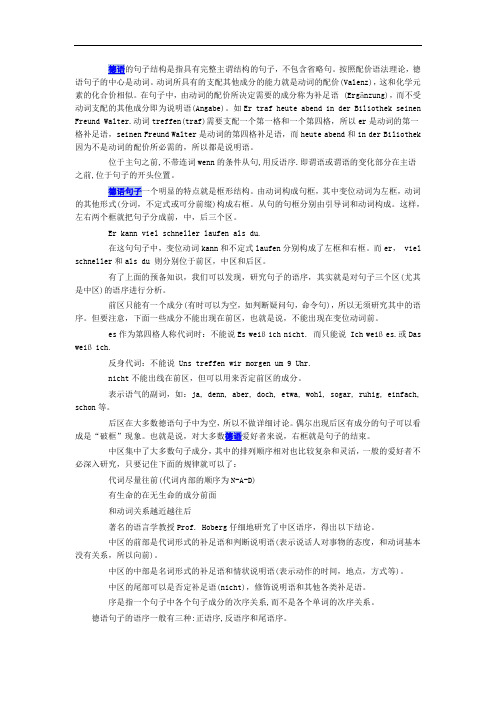
不包含省略句。
按照配价语法理论,德语句子的中心是动词。
动词所具有的支配其他成分的能力就是动词的配价(Valenz),这和化学元素的化合价相似。
在句子中,由动词的配价所决定需要的成分称为补足语(Ergänzung),而不受动词支配的其他成分即为说明语(Angabe)。
如Er traf heute abend in der Biliothek seinen Freund Walter.动词treffen(traf)需要支配一个第一格和一个第四格,所以er是动词的第一格补足语,seinen Freund Walter是动词的第四格补足语,而heute abend和in der Biliothek 因为不是动词的配价所必需的,所以都是说明语。
位于主句之前,不带连词wenn的条件从句,用反语序.即谓语或谓语的变化部分在主语之前,位于句子的开头位置。
由动词构成句框,其中变位动词为左框,动词的其他形式(分词,不定式或可分前缀)构成右框。
从句的句框分别由引导词和动词构成。
这样,左右两个框就把句子分成前,中,后三个区。
Er kann viel schneller laufen als du.在这句句子中,变位动词kann和不定式laufen分别构成了左框和右框。
而er, viel schneller和als du 则分别位于前区,中区和后区。
有了上面的预备知识,我们可以发现,研究句子的语序,其实就是对句子三个区(尤其是中区)的语序进行分析。
前区只能有一个成分(有时可以为空,如判断疑问句,命令句),所以无须研究其中的语序。
但要注意,下面一些成分不能出现在前区,也就是说,不能出现在变位动词前。
es作为第四格人称代词时:不能说Es weiß ich nicht. 而只能说Ich weiß es.或Das weiß ich.反身代词:不能说 Uns treffen wir morgen um 9 Uhr.nicht不能出线在前区,但可以用来否定前区的成分。
小结德语语法之德语句子的框形结构
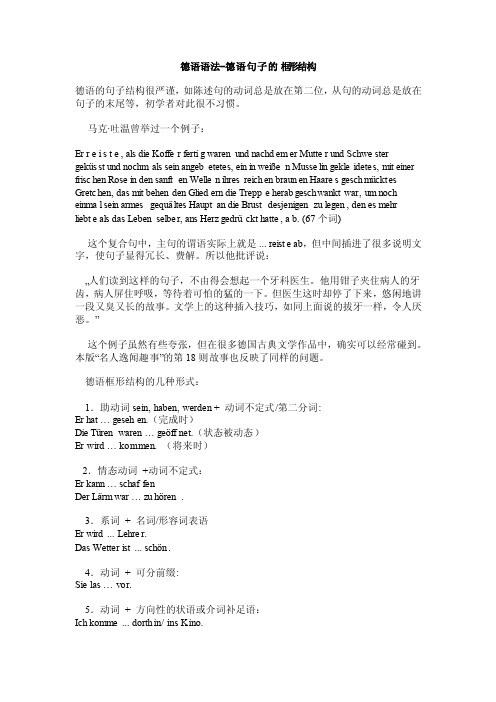
德语语法-德语句子的框形结构德语的句子结构很严谨,如陈述句的动词总是放在第二位,从句的动词总是放在句子的末尾等,初学者对此很不习惯。
马克·吐温曾举过一个例子:Er r e i s t e, als die Koffer fertig warenund nachde m er Mutter und Schwes tergeküss t und nochma ls sein angebe tetes, ein in weißen Mussel in geklei detes, mit einerfrisch en Rose in den sanfte n Wellen ihresreiche n braune n Haares geschmückte s Gretch en, das mit behend en Gliede rn die Treppe herabg eschw anktwar, um noch einmal sein armesgequäl tes Hauptan die Brustdesjen igenzu legen, den es mehrliebte als das Lebenselber, ans Herz gedrüc kt hatte, a b. (67个词)这个复合句中,主句的谓语实际上就是... reiste ab,但中间插进了很多说明文字,使句子显得冗长、费解。
所以他批评说:…人们读到这样的句子,不由得会想起一个牙科医生。
他用钳子夹住病人的牙齿,病人屏住呼吸,等待着可怕的猛的一下。
但医生这时却停了下来,悠闲地讲一段又臭又长的故事。
文学上的这种插入技巧,如同上面说的拔牙一样,令人厌恶。
德语句子顺序排列

德语句子顺序排列德语句子顺序排列如下:1、句子的分区大家知道,德语句子的一个明显的特点就是由动词的变位形式(finite Form)和不定形式(infinite Form,组成框形结构。
有的语言学家以左右两个框为界,把句子分为前区(Vorfeld)、中区(Mittelfeld)和后区(Nachfeld)三个部分:前区(Vorfeld)Peter前区具有承上启下的作用。
在正常的陈述句中,其主要成分是补足语(大部分是主语)和自由说明语(时间、地点、情态等)。
后区经常是空缺的,只有在“破框”情况时,后区才被占领。
(参见“框形结构和破框”一文。
)而中区则是句子信息的主要载体,是主要情节的演绎处。
除了占位词es以外,所有的句子成分都可以占据中区,其中的排列顺序相对也比较复杂和灵活。
以下重点介绍中区句子成分排列的语序。
2. 中区中句子成分的排列中区中句子成分的排列和可以分成三个区:前部、中部、尾部。
2.1 中区的前部(近左框)2.1.1 主语(在倒装句或从句中)占据开头位置,一般承接上文,反映话语的主题,信息值通常不高,不重读。
常为带定冠词的名词或代词:Gestern ist er in die Stadt gegangen.Linda ist nicht gekommen, weil sie krank ist.2.1.2 格位补足语(三、四格):hat 中区(Mittel-, Satz-, Hauptfeld) gestern einen Ball 后区(Nachfeld) gekauft fr seine Mannschaft2.1.2.1 三(D)、四(A)格都是名词:D(一般指有生命的)— A(有生命的或无生命的):Er hat dem Kind ein Buch gegeben. - Was hat er seinem Lehrer gegeben?带有新的信息(一般为带不定冠词的名词) A—D:Er hat das Buch einem Kind gegeben. - Wem hat er das Buch gegeben?2.1.2.2 三(D)、四(A)格都是代词:A—D:Er hat es ihm gegeben.2.1.2.3 三(D)、四(A)格中,一个是代词,一个是名词时,代词在前:Er hat es einem Kind gegeben.Er hat ihm ein Buch gegeben.2.1.3 判断说明语(Modalw?rter):判断说明语hoffentlich, m?glicherweise, sicherlich,bestimmt,leider,natrlich,vermutlich,vielleicht,wirklich等,表示说话人对某事物的态度Er hat sie m?glicherweise auf dem Bahnhof getroffen.Sie kann wahrscheinlich heute nicht kommen.这类词常常放到句首:Wahrscheinlich kann sie heute nicht kommen.2.2 中区的中部自由说明语往往是针对全句的,有相对固定的位置。
德语句子结构造型 常熟恒学内部资料

3-2 陈述句式,也可带主语
Du faehrst in die Stadt!
你乘车进城吧!
3-3 用第一虚拟式来表达祈使语气
Kommst du mit oder bleibst du hier?
你跟着一起走还是呆在这儿?
பைடு நூலகம்-4 反意疑问句:
Es ist kalt, nicht wahr?
常熟恒学教育11.8号德语课堂学习资料,学员反映老师讲的很好,幽默生动。摘要:朱老师。
1) 陈述句:陈述事实,说明看法,句末用句号
Er ist ein Lehrer.
他是老师。
2) 疑问句:提出问题,句末用问号,句子用升调。
天很冷,不是吗?
3) 祈使句:表示请求,命令,劝告,希望等,主语经常地省略,句末用叹号。
3-1 常见的句式:
Warte einen Moment!
等一会!
Wo sind Sie?
您在哪儿?
2-3 选择疑问句:
Kommst du mit mir oder mit ihr?
你跟我走还是跟她走?
请注意下面这样的疑问句:
Kommt sie heute nicht? Doch, sie kommt heute.
她今天不来了吗?不,她今天来。(反问)
2-2 特殊疑问句:用疑问词开头,句子用降调。
Lang lebe das Vaterland!
祖国万岁!
3-4) 对一个不在场的第三人提出要求,有听话人转告
Herr Wang soll morgen zu mir kommen!
叫王先生明天到我这儿来。
4) 感叹句:句末用感叹号,常省去谓语等成分
小结德语语法之德语句子的框形结构

德语语法-德语句子的框形结构德语的句子结构很严谨,如陈述句的动词总是放在第二位,从句的动词总是放在句子的末尾等,初学者对此很不习惯。
马克·吐温曾举过一个例子:Er r e i s t e, als die Koffer fertig waren und nachdem er Mutter und Schwestergeküsst und nochmals sein angebetetes, ein in weißen Musselin gekleidetes, mit einer frischen Rose in den sanften Wellen ihres reichen braunen Haares geschmücktes Gretchen, das mit behenden Gliedern die Treppe herabgeschwankt war, um noch einmal sein armes gequältes Haupt an die Brust desjenigen zu legen, den es mehr liebte als das Leben selber, ans Herz gedrückt hatte, a b. (67个词)这个复合句中,主句的谓语实际上就是... reiste ab,但中间插进了很多说明文字,使句子显得冗长、费解。
所以他批评说:…人们读到这样的句子,不由得会想起一个牙科医生。
他用钳子夹住病人的牙齿,病人屏住呼吸,等待着可怕的猛的一下。
但医生这时却停了下来,悠闲地讲一段又臭又长的故事。
文学上的这种插入技巧,如同上面说的拔牙一样,令人厌恶。
”这个例子虽然有些夸张,但在很多德国古典文学作品中,确实可以经常碰到。
本版“名人逸闻趣事”的第18则故事也反映了同样的问题。
德语框形结构的几种形式:1.助动词sein, haben, werden + 动词不定式/第二分词:Er hat … gesehen.(完成时)Die Türen waren … geöffnet.(状态被动态)Er wird … kommen. (将来时)2.情态动词+动词不定式:Er kann … schaffenDer Lärm war … zu hören.3.系词+ 名词/形容词表语Er wird ... Lehrer.Das Wetter ist ... schön.4.动词+ 可分前缀:Sie las … vor.5.动词+ 方向性的状语或介词补足语:Ich komme ... dorthin/ ins Kino.6.功能动词结构:Der Zug setzte sich … in Bewegung.从句中的句框由连接词+ 谓语组成。
德语陈述句中的语序问题

德语陈述句中的语序问题作者:周天兵来源:《科教导刊》2013年第29期摘要德语的语序问题一直困扰着德语初学者们。
本文尝试以陈述句为例,以主句为重点,用语言学的区位模式对不同的句子成分在句中的位置进行分析。
关键词陈述句区位模式框形结构前区中区后区中图分类号:H04 文献标识码:A笔者在德语学习和教学过程中,总是碰到语序问题,即不同的句子成分在句中的位置问题。
很多人和笔者一样,受到中文和英语语序的影响,觉得德语的语序既奇怪又复杂。
如:谓语的变位动词在陈述句中必须放在第二位;在疑问句中放在第一位;而在从句中则放在最后。
又如:很多表示情状的句子成分要放在谓语和宾语之间……其实,德语的语序问题不仅牵涉到词法和句法,而且和表述意图/修辞密切相关。
①在这里,笔者想以最常见的陈述句(Aussagesatz)为例,以主句(Hauptsatz)为重点,用语言学的区位模式(Stellungsfeldermodell)②对不同的句子成分在句中的位置进行分析。
1 谓语在陈述句中的位置及陈述句的分区(1)在德语的陈述句中,谓语如果是由一个变位动词构成,那么该动词必须放在句子的第二位。
③如:Peter kauft ein Buch. ④这个句子属于正语序。
(2)谓语如果是由几部分(变位动词、分词、不定式或可分前缀等)构成,那么就组成所谓德语句子的框形结构。
如:a) Er hat das Buch gelesen(助动词 haben + 动词的第二分词)b) Die Fenster waren den ganzen Tag gefnet.(助动词 sein + 动词的第二分词)c) Sie wird bestimmt kommen. (助动词 werden+ 动词不定式)d) Hier darf man nicht rauchen. (情态动词 +动词不定式)e) Um sechs Uhr steht er auf.(可分动词主干部分 + 可分前缀)如果在某陈述句句尾同时存在很多动词形式,那么就可根据它们之间的关系密切程度进行排列。
德语成分的排列顺序

德语成分的排列顺序概论:1.句子由一定的句子成分构成:主语、谓语、宾语、状语等。
2.在德语中,变位动词的位置相当重要:变位动词是带有人称词尾的动词形式,如ich gehe,du gehst。
3.变位动词在主从句中的位置原则上是不同的。
在一个完整陈述句或一般疑问句中,变位动词永远位于第二位。
4.主语可以在第一位,也可以在第三位(第四位),也就是说,它以变位动词为轴心。
5.表示否定:如果是对整个句子的否定,那么否定词nicht尽量靠近句末,但必须位于动词的第二部分前。
如果是对某个句子成分的否定,那么否定词nicht位于该句子成分前。
例如:Der Postbote kommt heute nicht. 邮递员今天不来。
(对整个句子的否定)Der Postbote ist heute nicht gekommen. 邮递员今天没有来。
(对整个句子的否定)Der Postbote kommt nicht heute, sondern morgen.邮递员今天不来,明天才来。
(对时间的否定)Nicht der Postbote kommt heute, sondern die Postbotin.今天不是那位邮递员先生来,而是那位邮递员小姐过来。
(对主语的否定)宾语的排列顺序主语谓语第一位(I)时,紧随第二位(II)的是变位动词。
对于a,b,c 在现在时、过去时和表示将来的形式(即现在时+时间状语)中,变位的实意动词位于第二位。
对于d,f 在现在完成时和过去完成时中,变位的助动词位于第二位,实意动词的第二分词形式位于句末。
对于e 有些动词要求第三格宾语或/和第四格宾语,如果句子中同时出现两个宾语,那么一般情况下第三格宾语位于第四格宾语前。
第一位和第三位的位置变换1.变换时,其他的句子成为位于第一位,变位动词位于第二位,主语位于第三位,这时占第一位的可以是其他任何成分。
2.变换时句子的意义基本不变,占第一位的通常是前面已经提到的某个成分,以此来强调行为的延续。
德语A1语法
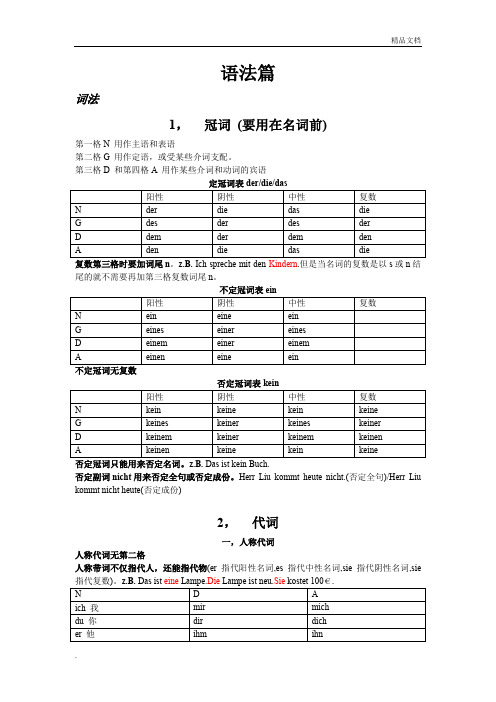
语法篇词法1,冠词(要用在名词前)第一格N 用作主语和表语第二格G 用作定语,或受某些介词支配。
第三格D 和第四格A 用作某些介词和动词的宾语复数第三格时要加词尾n。
z.B. Ich spreche mit den Kindern.但是当名词的复数是以s或n结尾的就不需要再加第三格复数词尾n。
不定冠词无复数否定冠词只能用来否定名词。
z.B. Das ist kein Buch.否定副词nicht用来否定全句或否定成份。
Herr Liu kommt heute nicht.(否定全句)/Herr Liu kommt nicht heute(否定成份)2,代词一,人称代词人称代词无第二格人称带词不仅指代人,还能指代物(er指代阳性名词,es指代中性名词,sie指代阴性名词,sie 指代复数)。
z.B. Das ist eine Lampe.Die Lampe ist neu.Sie kostet 100€.三,不定代词(man,jemand,niemand)不定代词只有格的变化,无词性变化3,形容词形容词比较级=形容词+er。
z.B.schöner形容词最高级=形容词+st。
z.B.schönst形容词作表语=am+形容词最高级+en。
z.B.Sie ist am schönsten形容词比较级、最高级变化列外规则-形容词以t,s,sch,ß,z结尾,特殊变化只体现在最高级。
要加上est。
z.B. leict→leichtest -形容词以er,el结尾,特殊变化只体现在比较级。
要去e加er。
z.B. teuer→teurer-大多数词干元音为a,o,u的单音节形容词,在升级时要变音。
z.B. alt→älter→ältest形容词原级间比较-so……wie…..-genauso……wie…….-ebenso…….wie………三格结构都解释为“一样的”。
德语语法简要总结
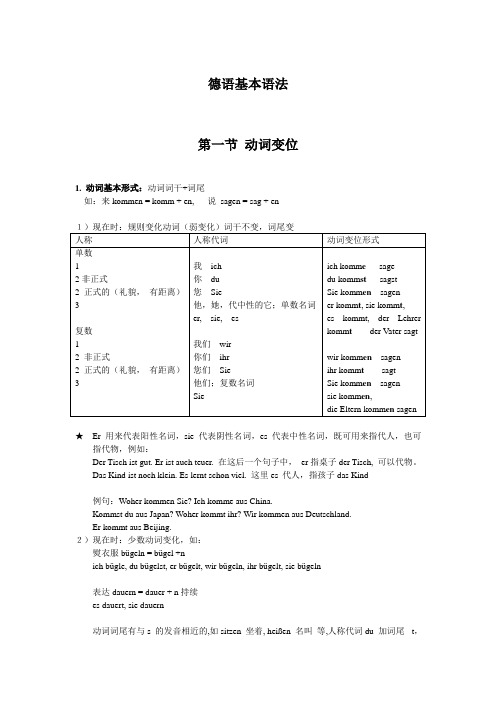
德语基本语法第一节动词变位1. 动词基本形式:动词词干+词尾如:来kommen = komm + en, 说sagen = sag + en★Er 用来代表阳性名词,sie 代表阴性名词,es代表中性名词,既可用来指代人,也可指代物,例如:Der Tisch ist gut. Er ist auch teuer. 在这后一个句子中,er指桌子der Tisch, 可以代物。
Das Kind ist noch klein. Es lernt schon viel. 这里es 代人,指孩子das Kind例句:Woher kommen Sie? Ich komme aus China.Kommst du aus Japan? Woher kommt ihr? Wir kommen aus Deutschland.Er kommt aus Beijing.2)现在时:少数动词变化,如:熨衣服bügeln = bügel +nich bügle, du bügelst, er bügelt, wir bügeln, ihr bügelt, sie bügeln表达dauern = dauer + n持续es dauert, sie dauern动词词尾有与s 的发音相近的,如sitzen 坐着, heißen 名叫等,人称代词du 加词尾-t,而不是–st du sitzt, er sitzt, du heißt, er heißt2. 现在时的句子结构;1)陈述句:Aussagesatz基本要求:动词在II位正语序:Ich gehe heute mit meinem Vater in die Stadt.我今天和我父亲进城去。
反语序:Heute gehe ich mit meinem Vater in die Stadt.Mit meinem Vater gehe ich heute in die Stadt.In die Stadt gehe ich heute mit meinem Vater.Aus China komme ich.造句:1. schreiben jetzt das Wort das BuchDu schreibst jetzt das Wort in das Buch.Jetzt schreibt er das Wort in das Buch.2. kaufen hier BlumenIhr kauft hier die schönen Blumen am 2. Juni, 2004.2)一般疑问句:Ja-Nein Frage基本要求:动词提前,放在句子开头Gehst du heute in die Stadt?回答:Ja, ich gehe. 是的,我去。
分析德语句子成分
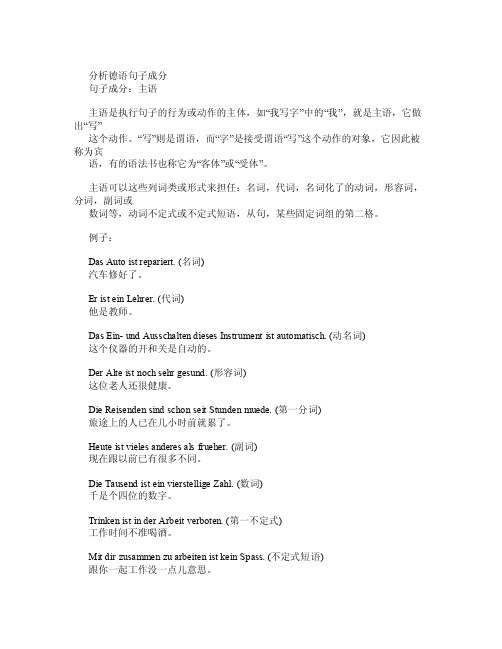
分析德语句子成分句子成分:主语主语是执行句子的行为或动作的主体,如“我写字”中的“我”,就是主语,它做出“写”这个动作。
“写”则是谓语,而“字”是接受谓语“写”这个动作的对象,它因此被称为宾语,有的语法书也称它为“客体”或“受体”。
主语可以这些列词类或形式来担任:名词,代词,名词化了的动词,形容词,分词,副词或数词等,动词不定式或不定式短语,从句,某些固定词组的第二格。
例子:Das A uto i st re parie rt. (名词)汽车修好了。
E r ist einLehre r. (代词)他是教师。
Das Ein- undAussc halte n die ses I nstru mentist a utoma tisch. (动名词)这个仪器的开和关是自动的。
Der A lte i st no ch se hr ge sund. (形容词)这位老人还很健康。
Die R eisen den s ind s chonseitStund en mu ede.(第一分词)旅途上的人已在几小时前就累了。
Heut e ist viel es an deres alsfrueh er. (副词)现在跟以前已有很多不同。
Die T ausen d ist einviers telli ge Za hl. (数词)千是个四位的数字。
Tri nkenist i n der Arbe it ve rbote n. (第一不定式)工作时间不准喝酒。
M it di r zus ammen zu a rbeit en is t kei n Spa ss. (不定式短语)跟你一起工作没一点儿意思。
分析德语句子成分

6- 从句 (略)
两个以上的状语在句子中排列顺序
1) 有时我们碰到一个句子里需要几个状语的情况,那么它们在排列上是否有
顺序的前后呢?
比如:
1- 星期六下午两点我跟劳拉一起到学校。
此工厂由于改建关闭了。
Wenn es nicht regnet, komme ich. (条件状语)
如不下雨,我就来。
Ich komme, um meine Freundin zu besuchen. (目的状语)
我来是为了看我的女友。
主语可以这些列词类或形式来担任:名词,代词,名词化了的动词,形容词,分词,副词或
数词等,动词不定式或不定式短语,从句,某些固定词组的第二格。
例子:
Das Auto ist repariert. (名词)
汽车修好了。
Er ist ein Lehrer. (代词)
Die Tausend ist ein vierstellige Zahl. (数词)
千是个四位的数字。
Trinken ist in der Arbeit verboten. (第一不定式)
工作时间不准喝酒。
Mit dir zusammen zu arbeiten ist kein Spass. (不定式短语)
1) 宾语的格:
Ich packe meine Buecher in die Mappe. (第四格,最常见)
我把书装进书包。
Ich helfe meiner Mutter. (动词宾语第三格)
我帮***忙。
Wem gehoert das Fahrrad. (动词宾语第三格)
德语语法总结
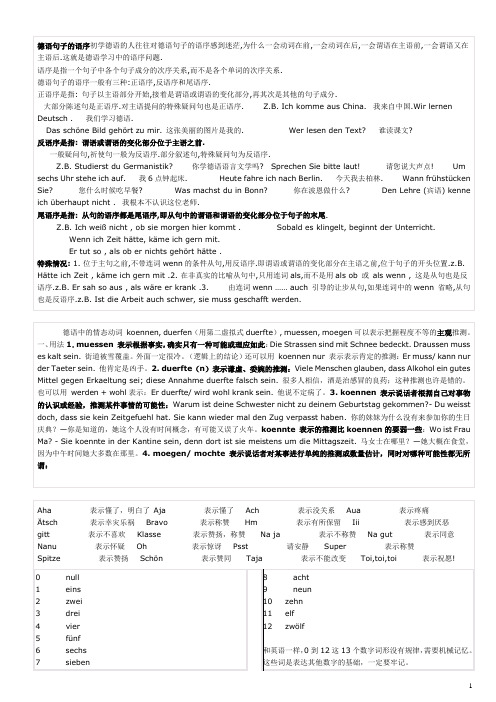
德语句子的语序初学德语的人往往对德语句子的语序感到迷茫,为什么一会动词在前,一会动词在后,一会谓语在主语前,一会谓语又在主语后.这就是德语学习中的语序问题.语序是指一个句子中各个句子成分的次序关系,而不是各个单词的次序关系.德语句子的语序一般有三种:正语序,反语序和尾语序.正语序是指: 句子以主语部分开始,接着是谓语或谓语的变化部分,再其次是其他的句子成分.大部分陈述句是正语序.对主语提问的特殊疑问句也是正语序. Z.B. Ich komme aus China. 我来自中国.Wir lernenDeutsch . 我们学习德语.Das schöne Bild gehört zu mir. 这张美丽的图片是我的. Wer lesen den Text? 谁读课文?反语序是指: 谓语或谓语的变化部分位于主语之前.一般疑问句,祈使句一般为反语序.部分叙述句,特殊疑问句为反语序.Z.B. Studierst du Germanistik? 你学德语语言文学吗? Sprechen Sie bitte laut! 请您说大声点! Umsechs Uhr stehe ich auf. 我6点钟起床. Heute fahre ich nach Berlin. 今天我去柏林. Wann frühstückenSie? 您什么时候吃早餐? Was machst du in Bonn? 你在波恩做什么? Den Lehre (宾语) kenneich überhaupt nicht . 我根本不认识这位老师.尾语序是指: 从句的语序都是尾语序,即从句中的谓语和谓语的变化部分位于句子的末尾.Z.B. Ich weiß nicht , ob sie morgen hier kommt . Sobald es klingelt, beginnt der Unterricht.Wenn ich Zeit hätte, käme ich gern mit.Er tut so , als ob er nichts gehört hätte .特殊情况: 1. 位于主句之前,不带连词wenn 的条件从句,用反语序.即谓语或谓语的变化部分在主语之前,位于句子的开头位置.z.B.Hätte ich Zeit , käme ich gern mit .2. 在非真实的比喻从句中,只用连词als,而不是用als ob 或 als wenn , 这是从句也是反语序.z.B. Er sah so aus , als wäre er krank .3. 由连词wenn …… auch 引导的让步从句,如果连词中的wenn 省略,从句也是反语序.z.B. Ist die Arbeit auch schwer, sie muss geschafft werden.13 dreizehn14 vierzehn15 fünfzehn16 sechzehn17 siebzehn18 achtzehn19 neunzehn13到19这7个数字都是以zehn结尾,开始有规律可循。
浅析德语动词句框结构

浅析德语动词句框结构作者:徐涛来源:《商情》2015年第36期【摘要】德语句子的构造非常独特。
陈述句时,句子中谓语经常由两个部分组成,它们不是按顺序排列,而是构成一个框架,即句子的框型结构,也是德语句子的基本框架。
德语的句框可分为两种及动词句框和从句句框。
下面对德语句子的动词句框结构方面进行了探讨。
【关键词】语言句框结构一、前言德语是一门较难的语言,特别是句子的词序,同我们的语言思维很不相同。
德语句子的构造非常独特。
与其它语言相比,德语句子有其独特的构造形式。
陈述句时,句子中谓语经常由两个部分组成,它们不是按顺序排列,而是构成一个框架,即句子的框型结构,也是德语句子的基本框架。
德语句子的这种框型结构,对于初学者来说,既感到困难,又感到不习惯,所以,它是德语学习中的一个难点。
德语的句框可分为两种及动词句框和从句句框。
在这里主要讲讲德语的动词句框。
二、动词句框结构及其几种构成形式既然它是德语学习的难点,我们首先来了解一下什么是德语动词句框结构。
德语陈述句时,变位动词总是位于第二位,也就是谓语的第一部分,是句框的前限,它须与主语的人称和数相一致,同时体现时态。
谓语的第二部分标志着句框的后限。
比如:Ich habe 3 Jahre Deutsch gelernt.(我学过三年德语。
)其中,habe助动词是变位动词,是谓语的第一部分,句框的前限。
而gelernt主动词是谓语的第二部分,句框的后限。
habe 与gelernt构成了一个现在完成时。
而habe与gelernt之间就形成一个框,其它的句子成分就必须放在这个框架里,比如:3 Jahre Deutsch就放在了habe与gelernt之间。
这就是德语动词的句框结构。
而德语动词句框结构的构成形式是多样的,它主要由以下几个方面构成:第一、助动词:sein, haben, werden。
sein和haben + 动词第二分词构成完成时,比如:Er ist zu dir gegangen.(他去了你那儿了)。
德语基本句型结构-德语介词和疑问词的变格总结
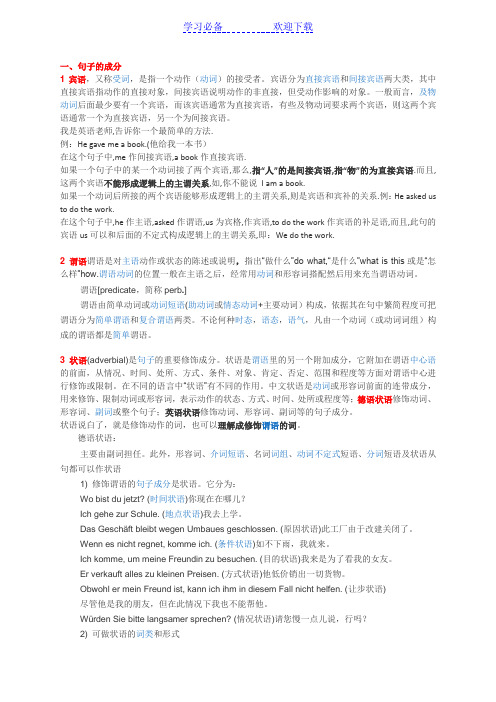
一、句子的成分1宾语,又称受词,是指一个动作(动词)的接受者。
宾语分为直接宾语和间接宾语两大类,其中直接宾语指动作的直接对象,间接宾语说明动作的非直接,但受动作影响的对象。
一般而言,及物动词后面最少要有一个宾语,而该宾语通常为直接宾语,有些及物动词要求两个宾语,则这两个宾语通常一个为直接宾语,另一个为间接宾语。
我是英语老师,告诉你一个最简单的方法.例:He gave me a book.(他给我一本书)在这个句子中,me作间接宾语,a book作直接宾语.如果一个句子中的某一个动词接了两个宾语,那么,指“人”的是间接宾语,指“物”的为直接宾语.而且,这两个宾语不能形成逻辑上的主谓关系,如,你不能说I am a book.如果一个动词后所接的两个宾语能够形成逻辑上的主谓关系,则是宾语和宾补的关系.例:He asked us to do the work.在这个句子中,he作主语,asked作谓语,us为宾格,作宾语,to do the work作宾语的补足语,而且,此句的宾语us可以和后面的不定式构成逻辑上的主谓关系,即:We do the work.2 谓语谓语是对主语动作或状态的陈述或说明,指出“做什么”do what,“是什么”what is this或是“怎么样”how.谓语动词的位置一般在主语之后,经常用动词和形容词搭配然后用来充当谓语动词。
谓语[predicate,简称perb.]谓语由简单动词或动词短语(助动词或情态动词+主要动词)构成,依据其在句中繁简程度可把谓语分为简单谓语和复合谓语两类。
不论何种时态,语态,语气,凡由一个动词(或动词词组)构成的谓语都是简单谓语。
3 状语(adverbial)是句子的重要修饰成分。
状语是谓语里的另一个附加成分,它附加在谓语中心语的前面,从情况、时间、处所、方式、条件、对象、肯定、否定、范围和程度等方面对谓语中心进行修饰或限制。
在不同的语言中“状语”有不同的作用。
深入了解德语语法复杂句子结构分析
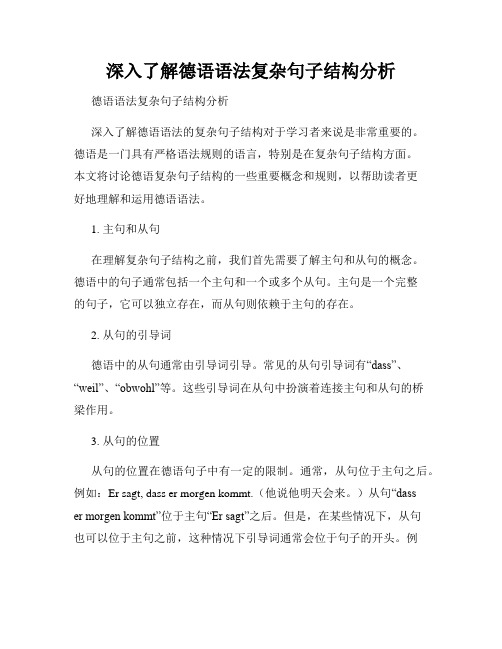
深入了解德语语法复杂句子结构分析德语语法复杂句子结构分析深入了解德语语法的复杂句子结构对于学习者来说是非常重要的。
德语是一门具有严格语法规则的语言,特别是在复杂句子结构方面。
本文将讨论德语复杂句子结构的一些重要概念和规则,以帮助读者更好地理解和运用德语语法。
1. 主句和从句在理解复杂句子结构之前,我们首先需要了解主句和从句的概念。
德语中的句子通常包括一个主句和一个或多个从句。
主句是一个完整的句子,它可以独立存在,而从句则依赖于主句的存在。
2. 从句的引导词德语中的从句通常由引导词引导。
常见的从句引导词有“dass”、“weil”、“obwohl”等。
这些引导词在从句中扮演着连接主句和从句的桥梁作用。
3. 从句的位置从句的位置在德语句子中有一定的限制。
通常,从句位于主句之后。
例如:Er sagt, dass er morgen kommt.(他说他明天会来。
)从句“dasser morgen kommt”位于主句“Er sagt”之后。
但是,在某些情况下,从句也可以位于主句之前,这种情况下引导词通常会位于句子的开头。
例如:Obwohl er krank ist, geht er zur Arbeit.(尽管他生病了,他还是去上班。
)4. 从句的语序德语中的从句语序相对灵活,但有一些基本规则需要遵守。
在从句中,动词通常位于句首,然后是主语和其他成分。
例如:Er sagt, dass er morgen kommt.(他说他明天会来。
)在从句“er morgen kommt”中,动词“kommt”位于句首,然后是主语“er”。
5. 从句的语法现象在德语复杂句子中,从句还涉及一些特殊的语法现象,如虚拟语气和倒装等。
例如:Wenn ich reich wäre, würde ich ein Haus kaufen.(如果我有钱,我就会买房子。
)这个句子中的从句“wenn ich reich wäre”使用了虚拟语气,表示与事实相反的情况。
德语语法简要总结
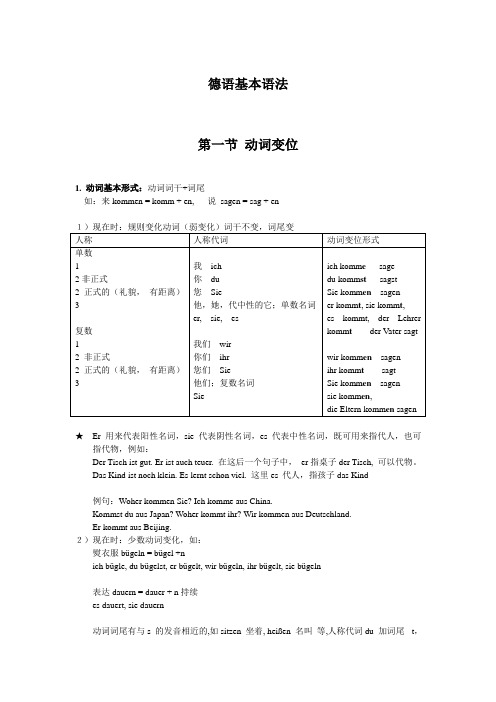
德语基本语法第一节动词变位1. 动词基本形式:动词词干+词尾如:来kommen = komm + en, 说sagen = sag + en★Er 用来代表阳性名词,sie 代表阴性名词,es代表中性名词,既可用来指代人,也可指代物,例如:Der Tisch ist gut. Er ist auch teuer. 在这后一个句子中,er指桌子der Tisch, 可以代物。
Das Kind ist noch klein. Es lernt schon viel. 这里es 代人,指孩子das Kind例句:Woher kommen Sie? Ich komme aus China.Kommst du aus Japan? Woher kommt ihr? Wir kommen aus Deutschland.Er kommt aus Beijing.2)现在时:少数动词变化,如:熨衣服bügeln = bügel +nich bügle, du bügelst, er bügelt, wir bügeln, ihr bügelt, sie bügeln表达dauern = dauer + n持续es dauert, sie dauern动词词尾有与s 的发音相近的,如sitzen 坐着, heißen 名叫等,人称代词du 加词尾-t,而不是–st du sitzt, er sitzt, du heißt, er heißt2. 现在时的句子结构;1)陈述句:Aussagesatz基本要求:动词在II位正语序:Ich gehe heute mit meinem Vater in die Stadt.我今天和我父亲进城去。
反语序:Heute gehe ich mit meinem Vater in die Stadt.Mit meinem Vater gehe ich heute in die Stadt.In die Stadt gehe ich heute mit meinem Vater.Aus China komme ich.造句:1. schreiben jetzt das Wort das BuchDu schreibst jetzt das Wort in das Buch.Jetzt schreibt er das Wort in das Buch.2. kaufen hier BlumenIhr kauft hier die schönen Blumen am 2. Juni, 2004.2)一般疑问句:Ja-Nein Frage基本要求:动词提前,放在句子开头Gehst du heute in die Stadt?回答:Ja, ich gehe. 是的,我去。
德语语法总结

单击添加副标题
汇报人:
目录
01 03 05
单击添加目录项标题
02
词法
04
句型与表达方式
06
德语语法概述 句法
特殊语法现象
01
添加章节标题
02
德语语法概述
德语语法的特点
词性:名词、动词、形容词、副词等 词序:主语-谓语-宾语 变格:名词、代词、形容词等有变格
动词变位:根据人称、数、时态、语态等 变化
主语+谓语+宾语+宾 语补足语
主语+谓语+宾语+宾 语补足语+状语
主语+谓语+宾语+宾 语补足语+状语+定语
并列句型
结构:由两个或两个以上的简单句组成用逗号或分号隔开
特点:每个简单句的语法结构相同表达方式相同
例子:Ich bin ein Lehrer und meine Fru ist eine Ärztin. 注意事项:并列句型中的简单句需要保持语法和表达方式的一致性 避免出现语法错误。
连词:用于连接句子或从句有单数和 复数形式
03
词法
名词
名词的性:阳性、阴性、中 性
名词的分类:普通名词、专 有名词、抽象名词等
名词的格:主格、宾格、属 格、与格等
名词的变格:根据词尾变化 进行变格如-e、-en、-er 等
动词
动词的分类:实义动词、助动词、情态动词等 动词的变位:根据人称、数、时态、语态等进行变化 动词的用法:作为谓语、宾语、定语等 动词的构成:由词根、词缀、词尾等组成
祈使语气:表示命令、请求的意思如"Lernen Sie Deutsch!"
- 1、下载文档前请自行甄别文档内容的完整性,平台不提供额外的编辑、内容补充、找答案等附加服务。
- 2、"仅部分预览"的文档,不可在线预览部分如存在完整性等问题,可反馈申请退款(可完整预览的文档不适用该条件!)。
- 3、如文档侵犯您的权益,请联系客服反馈,我们会尽快为您处理(人工客服工作时间:9:00-18:30)。
Modern Linguistics 现代语言学, 2015, 3, 46-55Published Online May 2015 in Hans. /journal/ml/10.12677/ml.2015.32006The Syntactic Structure of GermanDeclarative Sentences1Chien-Chun LinDepartment of Foreign Languages and Literatures, National Taiwan University, Taipei, TaiwanEmail: chienchunlintw@Received: Jan. 18th, 2015; accepted: Feb. 4th, 2015; published: May 12th, 2015Copyright © 2015 by author and Hans Publishers Inc.This work is licensed under the Creative Commons Attribution International License (CC BY)./licenses/by/4.0/AbstractLanguages play a vital role in communication and the exchange of ideas among people. A primary aim of learning a foreign language and being proficient in it is to be able to understand and ex-plore another country’s culture, history, society and so on. The German language belongs to the Indo-European languages. As an important European language, German is the closest one to Eng-lish. The major difference between the two is the higher complexity of German grammar which comprises a vaster set of rules. In contrast to the current German grammar references und specia-lized literature of German linguistics, this paper focuses on the deconstruction and analysis of declarative sentences to find the regulations followed in the arrangement of their syntactic struc-ture. Furthermore, this paper also depicts the flexibility of German syntax which allows for wider possibilities in sentence structure, and the nuances of this phenomenon in both spoken and writ-ten discourse. All of this will acquaint learners with the complexity of German syntax, in hopes of providing a tool that will guide them to use this language more accurately and freely.KeywordsGerman Grammar, German Syntax, German Didactics, Linguistics德语陈述句句法结构解析1林倩君台湾大学外国语文学系,台北,台湾1本论文的成果来自笔者在德国留学期间对德语语言学相关领域研习的积累和后来于德语教学实践中的探索和经验。
在此要特别感谢德国海德堡大学德文系Friedrich Strack教授对相关语言现象之议题的指教和富有成效的讨论。
德语陈述句句法结构解析Email: chienchunlintw@收稿日期:2015年1月18日;录用日期:2015年2月4日;发布日期:2015年5月12日摘要语言在人们相互间的沟通与交流中有着无可替代的作用。
学习直至精通他国语言,乃是了解与探究他国文化、历史、社会等的桥梁。
德语隶属于印欧语系,作为欧洲的一个重要语言其与英语最为接近2 [1],唯德语语法较为复杂且有诸多的规则和变化。
本论文旨在以德语语言的陈述句为中心来探讨德语中具有代表性的典型语句的结构、功能及其使用条件。
有别于目前坊间的德语语法参考书与专业文献对此类句法结构的阐述,本文在德语陈述句结构的解构与分析的基础上,在其句法构成的复杂性中找出其词序排列的规律性,提出具普遍意义的经验法则,同时归纳出语言实践中语句结构组织可能产生的变化及语者语意上所呈现的细微差异,由此以弥补目前对相应德语语法现象尚欠清晰的论述,期以让德语学习者在语句的掌握、表达与书写上更精准且能运用自如。
关键词德语语法,德语句法学,德语教学,语言学1. 引言德语的句子主要分三大类型: 陈述句(Aussagesatz)、疑问句(Fragesatz)、祈使句(Imperativer Satz)。
其中陈述句最为常见,其句型结构虽有别于疑问句和祈使句,但除了主语与支配句子成份的动词之外,他们所含句子成份的词序则大致相同。
德语句子的结构和词序相比于很多其他语言要来得更弹性,但这并不意味着可恣意使用,而是要掌握其内在的特定规则方可正确地运用和表述,否则容易产生错误语句。
如同其他语言,德语的书面语言要比口说语言严谨和规范,本论文对德语陈述句句法结构的探讨中兼顾了此两种不同的语言表述形式,若能掌握其的规律性,在进行口语沟通或书写文句时则更能精确不失准地表达语句的意涵。
“口语与书面语的差异,在学界亦有不同的定义。
一般来说,口语有其“非正式”之特性,书面语则有其“严谨”之特质,一如罗曼语学者Peter Koch将两者区分为“亲近的语言”(Sprache der Nähe)与“有距离的语言”(Sprache der Distanz)3[2];德国的文化学者Aleida Assmann和Jan Assmann则将两者分别归类为实时性的“沟通记忆”(Kommunikatives Gedächtnis)与长久性的“文化记忆”(Kulturelles Gedächtnis)4 [3]。
若从两者所扮演的媒介功能来区分,口说语言经由声音传达,它的持续时间取决于声波之长短; 而书面语言的传达则是种视觉现象,它不受时间与空间之限制5[4]。
相形之下,后者有更强的持久性和生命力。
德语的口说语言着重语者之间语意的沟通,其表达亦与语境密切相关,它的特性是简短与直接,在口语的表达上有更多语者的“自发性”(Spontaneität),如此则难以避免时而会有“激烈”或“粗俗”的话语出现,如Köter (“狗”的贬义词),schmeißen (“撂下”;“丢弃”)。
德语的书面语强调的是好的与2有关德语中来自英语的借字(Lehnwort)和外来词(Fremdwort)可参照Muhr, R. (2002) Anglizismen als Problem der Linguistik und Sprachpflege in Österreich und Deutschland zu Beginn des 21. Jahrhunderts. Eurospeak. Der Einfluss des Englischen auf europäische Sprachen zur Jahrhundertwende. Frankfurt am Main: Peter Lang, 9-54。
3参见Koch, P. (1986) Sprache der Nähe—Sprache der Distanz. Mündlichkeit und Schriftlichkeit im Spannungsfeld von Sprachtheorie und Sprachgeschichte. Romanisches Jahrbuch 36, 15-43。
4Assmann夫妇有关语言与文化的探讨参见Assmann, A. and J. (1988) Schrift, Tradition und Kultur. W. Reible (ed.). Zwischen Festtag und Alltag: Zehn Beiträge zum Thema, Mündlichkeit und Schriftlichkeit. Tübingen: Narr, 25-50。
5参见Eisenberg, P. (1998) Duden. Die Grammatik. Unentbehrlich für richtiges Deutsch, vol. 4, Mannheim: Duden, 54。
德语陈述句句法结构解析正确的德语,即着重规范的语法(Grammatik)、正字法(Rechtsschreibung)与标点符号(Interpunktion)的处理;好的笔者通常会尝试摆脱陈腔滥调的窠臼,寻找新鲜、优美与更贴切的表达6[5]。
本文在德语的口说语言部分侧重讨论语者间陈述与沟通上的简短性与直接性,书面语部分则是着重德语陈述句正确语法规则的探讨,在此基础上来讨论两者在语序结构上的差异。
本论文主要探讨德语陈述句的句型结构与其在用法上的变异,讨论字词与字词间如何接连成一个较大的语言单位7。
由于一个句子所表达的内容和意涵是由动词、各句子成份(Satzglieder)与其排列方式所共同决定,所以对德语语句的词序(Wortstellung)研究和探讨显得十分重要。
在此尤其要强调的是词序并非各个单字的次序,而是句子成份在句子中的排序8[6]。
例句1:Am 16. Januar schreiben die Studenten die Abschlussklausur. (一月十六日大学生们写期末考卷)例句2:Die Studenten schreiben am 16. Januar die Abschlussklausur.例句3:Die Abschlussklausur schreiben die Studenten am 16. Januar.例句4:Die Abschlussklausur am 16. Januar schreiben die Studenten.例句5:Am 16. schreiben Januar die Studenten die Abschlussklausur.*在例句1至4中经由句子成份的移动换位后仍能合乎语法规则且保有句子的原意,此句型范例显示了德语语句结构变化的弹性特征。
